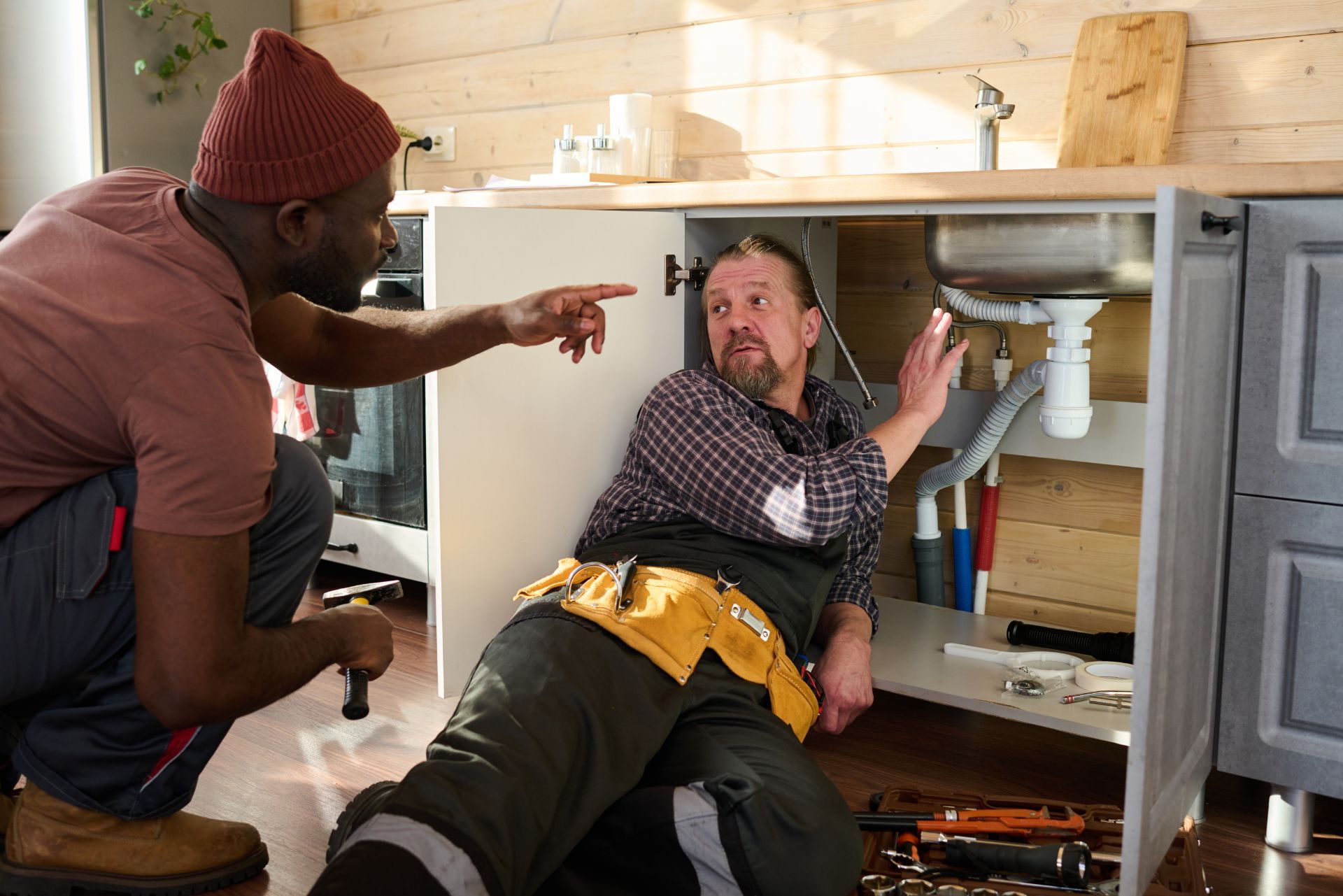Common Business Insurance Policies
By: Matt Larsen
Owner of Capstone Insurance Group & HVAC Contractor Insurance Advisor
763-242-1668
Index
Why Plumber Insurance is Crucial in Minnesota
Types of Insurance Coverage for Minnesota Plumbers
Legal Requirements for Plumber Insurance in Minnesota
Factors Influencing the Cost of Plumber Insurance in Minnesota
How to Choose the Right Insurance Provider for Your Plumbing Business
Contact Us
Phone
Location
Plumbing is an essential trade that keeps homes, businesses, and communities running smoothly. For plumbers in Minnesota, having the right insurance coverage is not just a smart business decision—it’s often a legal necessity. Understanding the ins and outs of plumber insurance in Minnesota can protect your livelihood, safeguard your clients, and provide peace of mind in a profession filled with risks.
This comprehensive guide will walk you through everything you need to know about Minnesota plumber insurance, including the types of coverage available, legal requirements, cost factors, and tips for choosing the best policy for your plumbing business.
Why Plumber Insurance is Crucial in Minnesota
Plumbing work inherently involves risks such as property damage, bodily injury, and even environmental hazards. In Minnesota, these risks are compounded by the state’s unique climate and regulatory environment, making insurance a critical component for any plumbing professional or company.
Protecting Your Business from Financial Loss
Accidents happen. A burst pipe during a repair, a slip and fall at a client’s property, or damage caused by faulty installation can lead to costly lawsuits or claims. Without proper insurance, these expenses come directly out of your pocket, potentially jeopardizing your business’s financial stability.
According to the National Association of Plumbing-Heating-Cooling Contractors (PHCC), liability claims against plumbers have increased by over 15% in the past five years nationwide, reflecting the growing importance of comprehensive insurance coverage.
Moreover, the financial implications of not having insurance can be devastating. For instance, a single incident might not only result in legal fees but could also lead to lost income due to work stoppages while you deal with claims or repairs. This is particularly concerning in Minnesota, where the cold winters can exacerbate plumbing issues, leading to an uptick in emergency calls. Having insurance can provide peace of mind, allowing you to focus on your work rather than worrying about potential financial ruin.
Meeting Legal and Contractual Requirements
In Minnesota, certain types of plumbing work require licensing and proof of insurance. Many clients, especially commercial ones, will also require contractors to carry specific insurance policies before awarding contracts. Having the right insurance ensures compliance with state laws and helps you win more business.
Additionally, understanding the various types of insurance available is crucial for any plumbing professional. General liability insurance, workers' compensation, and professional liability insurance each serve different purposes and can protect you from various risks associated with your work. For example, workers' compensation is essential in a physically demanding field like plumbing, where injuries can occur on the job site. By investing in the right coverage, you not only safeguard your business but also enhance your reputation as a responsible and reliable contractor, making you more attractive to potential clients.

Types of Insurance Coverage for Minnesota Plumbers
Plumbing businesses in Minnesota typically need a combination of insurance policies to cover the full spectrum of risks. Here are the most common types of insurance relevant to plumbers in the state.
General Liability Insurance
This is the cornerstone of plumber insurance. General liability insurance protects against claims of bodily injury, property damage, and personal injury caused by your business operations. For example, if a client slips on a wet floor you left behind or if your work damages a client’s property, this insurance helps cover legal fees and settlements.
The average general liability policy for plumbers in Minnesota ranges from $400 to $1,000 annually, depending on coverage limits and business size. It’s important for plumbing businesses to regularly review their policies to ensure they have adequate coverage as their operations grow or change, as well as to stay informed about any new risks that could arise in the industry.
Commercial Auto Insurance
Many plumbers use vehicles to transport tools and materials. Commercial auto insurance covers vehicles used for business purposes, protecting against accidents, theft, and damage. Personal auto policies typically do not cover business-related driving, making this insurance essential. Additionally, having commercial auto insurance can also provide peace of mind, knowing that your business assets are protected while on the road.
Workers’ Compensation Insurance
In Minnesota, businesses with one or more employees are generally required to carry workers’ compensation insurance. This coverage provides medical benefits and wage replacement for employees injured on the job. Plumbing involves physical labor and hazardous environments, so this insurance is vital for protecting your workforce and complying with state laws. Furthermore, having workers' compensation can enhance your business's reputation, showcasing your commitment to employee safety and well-being.
Professional Liability Insurance (Errors and Omissions)
Also known as E&O insurance, this policy covers claims arising from professional mistakes or negligence that result in financial loss for a client. For example, if a plumbing design flaw leads to costly damage, this insurance can cover legal costs and settlements. This type of insurance is particularly important for plumbers who offer consulting services or design work, as it protects against the unique risks associated with providing professional advice.
Tools and Equipment Insurance
Plumbers rely heavily on specialized tools and equipment. This insurance protects against loss, theft, or damage to your tools, which can be costly to replace and disrupt your work. Given the high cost of professional-grade plumbing tools, having this coverage can be a financial lifesaver. Additionally, some policies may even cover rental costs for replacement tools while yours are being repaired or replaced, ensuring that your business operations can continue with minimal interruption.
Surety Bonds
While not technically insurance, surety bonds are often required for licensing and contracts. A bond guarantees that you will fulfill your contractual obligations. If you fail to do so, the client can claim against the bond for compensation. Surety bonds not only protect your clients but also enhance your credibility as a plumbing contractor, making it easier to secure contracts and build lasting relationships in the industry. Understanding the specific bonding requirements in Minnesota can help you navigate the regulatory landscape more effectively.
Legal Requirements for Plumber Insurance in Minnesota
Understanding the legal landscape is essential for compliance and avoiding penalties. Minnesota has specific laws regarding licensing and insurance for plumbers.
Licensing and Insurance Mandates
To legally operate as a plumber in Minnesota, you must obtain a state plumbing license. The Minnesota Department of Labor and Industry (DLI) oversees licensing and requires proof of insurance as part of the application process. This typically includes general liability insurance and workers’ compensation if you have employees.
Failing to maintain the required insurance can result in license suspension or revocation, fines, and legal liabilities. Moreover, having the right insurance not only protects you legally but also enhances your credibility with clients. Many homeowners and businesses prefer to hire licensed and insured plumbers, as it provides them with peace of mind knowing that they are working with a professional who meets state standards.
Workers’ Compensation Requirements
Minnesota law mandates that employers with one or more employees carry workers’ compensation insurance. This law applies to plumbing contractors who hire assistants, apprentices, or other staff. Even if you are a sole proprietor with no employees, it’s wise to consider this coverage for yourself. Workers’ compensation insurance can cover medical expenses and lost wages for employees who are injured on the job, which is particularly important in a physically demanding field like plumbing.
Additionally, having workers’ compensation insurance can protect your business from potential lawsuits stemming from workplace injuries. In the event of an accident, this insurance can help mitigate financial strain, allowing you to focus on your work rather than worrying about legal repercussions or medical bills. It’s a crucial safety net that underscores the importance of prioritizing both employee well-being and business sustainability.
Contractual Insurance Requirements
Many commercial clients and government contracts require plumbers to carry specific insurance coverage with minimum limits. These requirements often exceed state minimums and may include additional insured endorsements, waivers of subrogation, and higher coverage limits. Understanding these contractual obligations is vital for securing larger projects and maintaining good relationships with clients.
Moreover, being aware of the nuances in these contracts can save you from costly disputes down the line. For instance, some contracts may stipulate that you must name the client as an additional insured on your policy, which can provide them with coverage in case of a claim related to your work. This requirement not only protects the client but also demonstrates your professionalism and commitment to risk management, making you a more attractive choice for potential clients in a competitive industry.
Factors Influencing the Cost of Plumber Insurance in Minnesota
Insurance premiums for plumbers vary widely based on several factors. Understanding these can help you manage costs while ensuring adequate coverage.
Business Size and Revenue
Larger businesses with higher revenues typically pay more for insurance because they face greater exposure to claims. A solo plumber working part-time will generally have lower premiums than a company with multiple employees and vehicles. Additionally, the number of employees can influence the risk profile; more workers mean more opportunities for accidents or errors, which can lead to claims. Therefore, as a plumbing business grows, it’s crucial to reassess insurance needs regularly to ensure that coverage aligns with the evolving scale and scope of operations.
Coverage Limits and Deductibles
Higher coverage limits increase premiums but provide greater financial protection. Choosing higher deductibles can lower premiums but means more out-of-pocket expenses if a claim occurs. It's essential to strike a balance between affordability and adequate coverage. Plumbers should evaluate the potential risks associated with their work and consider how much they can realistically afford to pay out-of-pocket in the event of a claim. This assessment can help in selecting the most appropriate coverage limits and deductible amounts that align with their financial situation and risk tolerance.
Claims History
Insurers consider your past claims when setting premiums. A history of frequent or severe claims can lead to higher rates, while a clean record may qualify you for discounts. Moreover, maintaining a good relationship with clients and ensuring high-quality work can help reduce the likelihood of claims. Implementing safety protocols and investing in training can further mitigate risks, potentially leading to lower insurance costs over time. Insurers may also offer incentives for businesses that demonstrate a commitment to risk management practices.
Location and Service Area
Operating in urban areas like Minneapolis or St. Paul may involve higher premiums due to increased risk factors such as traffic accidents or property values. Conversely, rural areas might have lower rates but could face other risks like weather-related damage. Additionally, the local regulatory environment can impact insurance costs; regions with stringent building codes or higher liability standards may result in increased premiums. Understanding the specific risks associated with the service area can help plumbers make informed decisions about their insurance needs and potentially negotiate better rates.
Type of Plumbing Work Performed
Specialized plumbing services, such as
gas line installation or commercial plumbing, may carry higher risks and insurance costs compared to standard residential repairs. These specialized services often require additional training and certifications, which can also influence insurance premiums. Furthermore, the complexity of the work can lead to a higher likelihood of accidents or claims, prompting insurers to adjust rates accordingly. Plumbers should consider the full scope of their services and the associated risks when evaluating their insurance options, as this can significantly impact overall costs and coverage needs.

How to Choose the Right Insurance Provider for Your Plumbing Business
Selecting the right insurance partner is crucial for securing the best coverage and service. Here are some tips to guide your decision.
Work with a Specialist Agent
Insurance agents who specialize in contractor or trades insurance understand the unique risks plumbers face. They can tailor policies to your specific needs and help you navigate complex requirements. These specialists are often well-versed in the nuances of plumbing work, including the potential for water damage, liability issues, and equipment breakdowns. Their expertise can save you time and money, ensuring that you have the right coverage in place from the start.
Compare Multiple Quotes
Don’t settle for the first quote you receive. Comparing offers from several insurers ensures competitive pricing and helps identify the best coverage options. This process not only allows you to find the most cost-effective solution but also gives you a chance to assess the different services and support each provider offers. Some insurers may provide additional perks, such as risk management resources or training programs, which can be invaluable for your business.
Check Financial Strength and Reputation
Choose insurers with strong financial ratings from agencies like A.M. Best or Standard & Poor’s. Reading customer reviews and seeking recommendations from fellow plumbers can also provide insight into the company’s reliability and claims service. A provider with a solid reputation is more likely to be responsive and fair when it comes to handling claims, which can be critical in times of need. Additionally, consider how long the insurer has been in business; a long-standing company may have more experience dealing with industry-specific issues.
Understand Policy Details
Carefully review what each policy covers and excludes. Pay attention to coverage limits, deductibles, exclusions, and any additional endorsements or riders you might need. It’s also wise to inquire about the claims process and how quickly claims are typically settled. Understanding these details can prevent unpleasant surprises down the line and ensure that you’re adequately protected against common risks, such as job site accidents or property damage caused by plumbing failures.
Consider Bundling Policies
Many insurers offer discounts if you bundle multiple policies, such as general liability, commercial auto, and workers’ compensation. Bundling can simplify management and reduce overall costs. Furthermore, having all your insurance with one provider can streamline communication and make it easier to manage renewals and claims. This can be particularly beneficial for busy plumbing businesses where time is of the essence, allowing you to focus on serving your clients rather than juggling multiple insurance providers.
Additional Tips for Minnesota Plumbers Regarding Insurance
Keep Detailed Records
Maintaining thorough documentation of your work, contracts, and safety protocols can help defend against claims and speed up the claims process if necessary.
Review Your Insurance Annually
Your business needs evolve over time. Regularly reviewing your insurance ensures your coverage keeps pace with growth, new services, or changes in state laws.
Invest in Safety and Training
Implementing safety programs and ongoing training reduces the likelihood of accidents and claims, which can positively impact your insurance premiums.
Understand Minnesota’s Unique Risks
The state’s cold winters can cause plumbing emergencies like frozen pipes, increasing risk exposure. Being aware of these factors can help you choose appropriate coverage and prepare your business accordingly.
Conclusion
For plumbers in Minnesota, insurance is more than a regulatory checkbox—it’s a vital safeguard for your business, your employees, and your clients. By understanding the types of coverage available, legal requirements, and cost factors, you can make informed decisions that protect your livelihood.
Investing in the right insurance policies tailored to your plumbing business will help you navigate risks confidently, comply with state laws, and build trust with your customers. Take the time to research, compare, and consult with insurance professionals to ensure your business is well-protected today and in the future.






